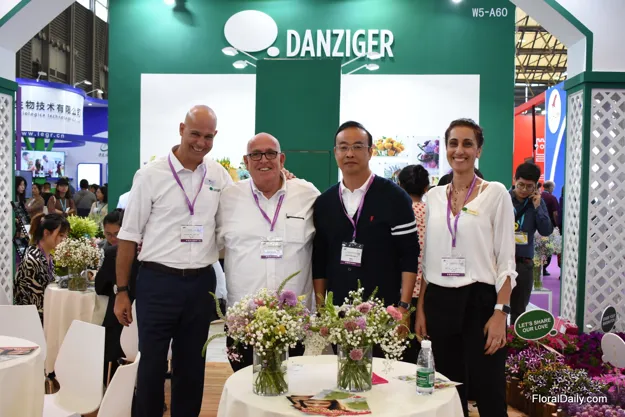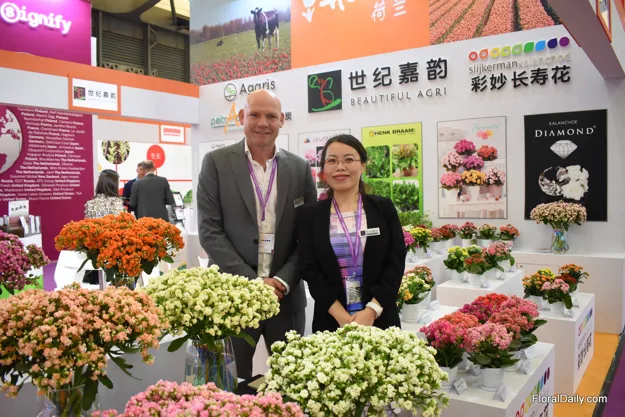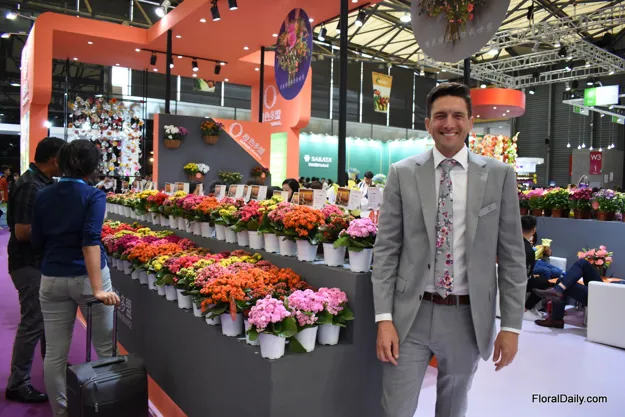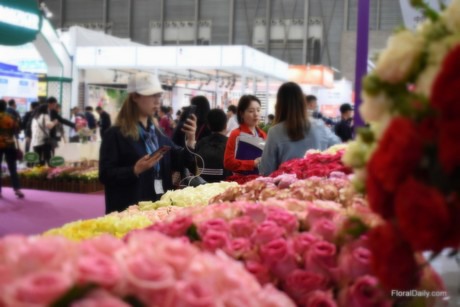Illegal propagation is still a major issue for breeders and distributors in China. Even though, China officially ratified the International Convention for the Protection of New Varieties of Plants (“UPOV Convention”) in April 1999, growers who share or exchange propagation materials in violation of the laws are seldom sued. Therefore, many foreign breeders are hesitant to introduce a new variety and particularly one that is 'easy' to propagate. According to many, this issue of not respecting the IP rights is holding back the ornamental industry growth.

The Danziger team at the Hortiflorexpo IPM Shanghai 2019
Limited assortment
At the Hortiflorexpo IPM Shanghai, that was held in April, we discussed this issue with several breeders. In general, we see that the breeders regret the situation and particularly for the growers. "The good growers are hit as the current situation is limiting the access to new and improved varieties. They can have more varieties if the breeders' rights are being respected", many say.
Limited choice for distributors as well
Micha Danziger, Chairman of Danziger adds that also the distributors are annoyed with the illegal propagation that is going on in the country. "We are working with various renowned and trustworthy nurseries, however they too are being harmed by the unfair competition of others, propagating illegally. When they see a new variety, their first question is: "Is it easy to propagate". Because if it is, they will not choose for this variety. So, many therefore choose tissue culture, lab production or bulbs as they are difficult to propagate."

Stefan Slijkerman of Slijkerman Kalanchoe and Sandy Yun of Beautiful Agri - the Chinese agent of Slijkerman - at the Hortiflorexpo IPM Shanghai 2019.
Quality material
Also the quality of the products in general is decreasing. "In China, 60% is being illegally propagated and due to this illegal propagation, growers have to deal with more viruses”, says Stefan Slijkerman of Slijkerman Kalanchoe. He breeds kalanchoes, which are propagated in Kenya. "We notice that the professional growers trust the African cuttings more than that of a Chinese grower. In this way, we try to keep a step ahead of the local illegal products on the market."
Fast learning
But the industry is learning fast and on the one hand, this is worrying Slijkerman. "About 55% of the students at the Wageningen University are from China. I think that, in 10 years, they will breed themselves and that we lose out on the long term. The advantage we have is that we can innovate quickly and if we can stay ahead, it can keep us in the market."
 The team of Selecta One at the Hortiflorexpo IPM Shanghai 2019
The team of Selecta One at the Hortiflorexpo IPM Shanghai 2019
On the other hand, the fact that growers are becoming more professional, might also contribute to more legal propagation, mentions Peter Nederlof, Area Manager at Selecta One. “As growers are becoming more professional, own propagation does not fit in the cultivation schedule.”
Working with breeding companies
While there is still a lot of illegal propagation going on, there is also a growing number of ethical production companies which have seen the value in working with the breeding companies, stresses Chris Berg of Dümmen Orange. “They have realized that creating these trusted relationships and partnerships will give them access to the newer genetics and more information on how to grow this market. While we cannot stop those growers who are doing illegal propagation, we also cannot allow them to hold up the progress of our industry developing in this market through reputable businesses.”
And also according to Nederlof, this is where the hope lies. “All links in the chain need to recognize the importance, not only the breeders.”
 Chris Berg of Dümmen Orange at the Hortiflorexpo IPM Shanghai 2019
Chris Berg of Dümmen Orange at the Hortiflorexpo IPM Shanghai 2019
Also, Tracy Chang, China Marketing Manager at Ball Horticultural Company & PanAmerican Seed mentions the importance of cooperating. “A breeder needs to have long term local partners in China. And help you develop the business together in China. Ball (PanAmerican Seed) started our business in China in the early 90s’, until now, Ball already has 4 Joint venture plug/liners production facilities covering the major area of China.”
"IP promotion in the floriculture industry led by President Xi Jinping"
Fortunately, the Chinese now seem to understand the advantages of respecting International Property rights. "They understand that they can produce quicker and a better product, and particularly if they are eager to start exporting their products", says Danziger. However, according to him, more is needed. "The president Xi Jinping has mentioned this to be a key issue. At the CIOPORA AGM 2019 held this April, we were happy to have high ranking government representatives from China. They were extremely knowledgeable and enthusiastic to promote IP rights in China. Hopefully, this message will come into practice in the Chinese business arena, as IP is crucial for the development of the industry. More specifically, we hope the most updated UPOV convention will be adopted by China thus also incorporating Essentially Derived Varieties (EDV) provisions (as determined by CIOPORA) and complying to the global standard in our industry. This will promote the efforts of Chinese breeders to distribute their varieties out of China and will allow for export of flowers from China to countries which concur to royalty payment mechanisms."

Part of the team of Ball Horticultural at the Hortiflorexpo IPM Shanghai 2019
Final price of end product can be higher
Nederlof also mentions that the price of the end product can be higher, which in turn will enable more growers to pay the royalties. “Because the price of some products has been historically low, it’s more difficult to get growers to pay the royalties on those products. That shouldn’t be the case for newer products, however. Still, some traders argue that those newer products should have the same low price as in the past. But in the private market, there’s no reason for products to be priced so low.”
However, it is also important that breeders make reasonable royalty offers, stresses Chang. “As China is a price pressure market, it is also important that breeders understand the China market and therefore should make reasonable royalty offers to their customers.”

Picture was taken at Hortiflorexpo 2019 in Shanghai, China.
Collecting royalties at the auction
Another evidence for the fact that the importance for IP is becoming more and more understood is the initiative of the Kunming International Flower Auction Trading Center Co., Ltd. (KIFA). This auction collects the royalties for rose breeders for over 10 years now. After traveling abroad many times, they reached a cooperation intention with several breeders and established the "Management Measures for the Tripartite Cooperation of New Varieties" in 2006.
With this method, KIFA is the connection between growers, and works as follows: after new varieties enter the country, they obtain patent certificates in China, they authorize the growers to produce, and the finished products are traded through the KIFA platform. Depending on the variety, the breeder receives 5% - 10% of the yield, which is then handed over by KIFA. "A new service mechanism for the whole chain from introduction, trial planting, planting, technical guidance and marketing has been formed", the auction says.
Since 2013, this model has achieved remarkable results and by the end of 2018, 156 new foreign patent varieties and 27 domestic patent varieties were introduced to the Chinese market. In 2018 alone, the patent fee charged by this auction reached more than 14 million. "And there are more international breeders ready to join, which has enabled the latest popular varieties in the international market to enter China, which has effectively promoted the upgrading of flower varieties in our province and enhance the competitiveness of “Yunhua” in the international arena."
Currently, this method is only used for roses, but it is not excluded that other varieties can also collect variety rights in this way.
Good hopes for the future
All in all, most breeders have good hope that the illegal propagation in the high-quality and professional part of the ornamental industry will decrease in the future. “When the trade gets used to the higher quality of the legally propagated products, the demand for unreliable production methods will decrease”, says Nederlof. And According to him, it is possible to convince the retail to only buy “legal” material. “E-commerce is a growing industry for the private market. This requires high-quality products and production methods.”
“However, we need to understand that China is a really big country and we have a lot of small growers around”, says Chang. “Therefore, it will take time and it will be very hard to cover every part of China and cover every person just by some laws. So, how to protect the breeders' rights step by step and take practical and effective action is very important. For example, the big growers or big influencers must have the sense to follow the laws, and the government public project should be against the use of illegal propagation material/plants.
